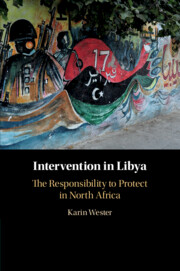Book contents
- Intervention in Libya
- Intervention in Libya
- Copyright page
- Dedication
- Epigraph
- Contents
- Preface
- Maps
- Introduction
- 1 The Origin of the Responsibility to Protect
- 2 Authority Based on Protection in a Historical Context
- 3 Libya and the Era of Qadhafi’s Rule
- 4 The Libyan Uprising and the International Response, February 15–26, 2011
- 5 The Libyan Uprising and the International Response, February 26–March 17, 2011
- 6 Operation Odyssey Dawn
- 7 Operation Unified Protector, NATO, and the UN
- 8 A Divided International Community Confronts a Divided Libya
- 9 Lessons to Be Learned
- Epilogue
- Select Bibliography
- Index
1 - The Origin of the Responsibility to Protect
Published online by Cambridge University Press: 28 February 2020
- Intervention in Libya
- Intervention in Libya
- Copyright page
- Dedication
- Epigraph
- Contents
- Preface
- Maps
- Introduction
- 1 The Origin of the Responsibility to Protect
- 2 Authority Based on Protection in a Historical Context
- 3 Libya and the Era of Qadhafi’s Rule
- 4 The Libyan Uprising and the International Response, February 15–26, 2011
- 5 The Libyan Uprising and the International Response, February 26–March 17, 2011
- 6 Operation Odyssey Dawn
- 7 Operation Unified Protector, NATO, and the UN
- 8 A Divided International Community Confronts a Divided Libya
- 9 Lessons to Be Learned
- Epilogue
- Select Bibliography
- Index
Summary
This chapter contains an examination of the origin of the responsibility to protect and the process leading to its adoption at the UN World Summit in 2005. Also, the question of to what extent the responsibility to protect is enshrined in existing international law is addressed. It transpires that the responsibility – or rather duty – of states to protect persons within their jurisdiction is already clearly rooted in existing international law. However, the complementary responsibility of the international community has a much weaker legal basis. The adoption of the responsibility to protect can be regarded as an explicit acknowledgement that protection against large-scale human rights violations is in part the responsibility of the international community – and this should be considered the most significant aspect of the principle.
Keywords
- Type
- Chapter
- Information
- Intervention in LibyaThe Responsibility to Protect in North Africa, pp. 11 - 23Publisher: Cambridge University PressPrint publication year: 2020

